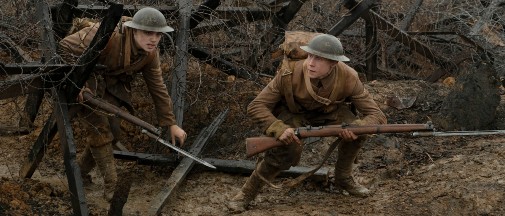
Sam Mendes may be winning prizes left and right for his World War I epic, but a big element of the production has been ignored by awards bodies. As it happens with many epics, the actors of 1917 are forgotten amid their picture's celebration. It's difficult to consider the human element of a spectacle that calls so much attention to the craft of its construction, its beauty, and savagery. Instead of chewing on the scenery, these actors are consumed by it and fully digested.
As we start approaching the finish line of this Oscar race, one question looms over the Best Picture category. Can 1917 overcome its actorly lacunas and defeat Parasite in all its SAG-crowned glory? On the other hand, are those perceived lacunas a reality or a byproduct of the epic scale...

In terms of character building and performance needs, most anglophone cinematic epics are divided into two groups. Some anchor their tapestry in a very well-defined personality. These function as character studies exploded into grandeur and present acting challenges easy to recognize and applaud. Then, there are other types of narrative, ones in which the big wonderment of craft, world-building and weighty themes are the heart and the raison d'être for the movie. In these cases, the actors have to match the form in symbiotic style or complement it by contrast, using humanity to highlight the dimension of the movie monument. 1917, it should go without saying, belongs to this second group.
At the center of the Sam Mendes' storm, we encounter the roughly sketched character of Lance Corporal Schofield, played by George MacKay. His presence doesn't give shape to the story as much as supports it. MacKay may be the lead actor but he's also a supporting player to the star of the show, Roger Deakins' camera. That doesn't mean his work is easy. Not only is this a physically challenging role, but one that requires the actor to fill in the blanks of the script with personable details. If this desperate fighter ever feels like a person instead of a cipher, it's all due to MacKay's considerable efforts.

It's there in the big brother dynamic he develops with Dean-Charles Chapman's Lance Corporal Blake, a mix of fraternal affection and tempered annoyance. It's there in the way he constantly pauses and contemplates the risks he's taking, sometimes falling out of rhythm with the propulsive camera movement for a single beat. It's there in his perplexed gentleness towards a frightened Frenchwoman, played by Claire Duburcq. MacKay takes an avatar for the audience and stubbornly builds a character out of him.
Chapman isn't as interesting, partly because he seems to fight against the immersive realism required by the film's construction. A bit of actorly showmanship is fine when it comes in small doses, like 1917's parade of prestigious British thespians. There's also the matter that the character's naivety is a bit hard to swallow, a problem the actor doesn't come close to solving. Considering how much of the film's tenuous emotional impact depends on Blake, this is a major issue.

The rest of the supporting cast is much better if a bit distracting in that way so typical of Hollywood's biggest projects. Think of the character actors in Gone with the Wind, Ben-Hur or All Quiet on the Western Front. In 1917, Colin Firth and Mark Strong are paragons of upper-class authority in its more benign form, delivering every line with starched crispness. Andrew Scott is asked to be a shot of cynicism and does just that. Benedict Cumberbatch similarly takes the stubborn official's archetype and plays it up. All of them perform just one note in this symphony, but they do it with gusto.

Finally, we have the film's best performance. It's a tiny cameo that manages to do what all the other actors are trying to do, whether playing archetypes or the audience's avatar. Near the end of this odyssey, Richard Madden appears. In his poised stance and wavering expression, we see the relief of survival, genuine kindness, a gut-punch of grief and the sorrow of a man who must keep standing for the sake of others while despair otherwise takes him. 1917 might not be an actor's film, it might even be devoid of much emotional power. However, when Richard Madden's on-screen it turns into a masterclass on how to act an epic, turning a monument of craft into a song for wounded humanity.